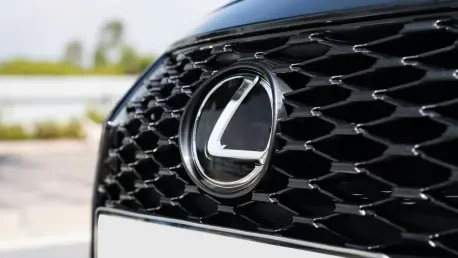Tesla’s Giga Shanghai may soon have a formidable competitor in the form of Lexus’s groundbreaking move into China’s electric vehicle (EV) market. With an ambitious plan to construct its first wholly-owned EV plant in Shanghai by 2027, Lexus is poised to revolutionize its approach to sustainable transportation and challenge the established order.
Lexus’s plan to build an EV plant in Shanghai, a sprawling urban and industrial enclave, underscores the company’s commitment to future technologies and clean energy. This bold move could redefine the competitive dynamics of the Chinese EV market, raising crucial questions about the future of electric vehicles in the world’s most populous nation. As Lexus embarks on this journey, the excitement is palpable, but so are the formidable challenges.
Lexus’s Bold Move into China’s EV Market: What’s at Stake?
Choosing Shanghai’s Jinshan district for this venture is no coincidence. The district’s strategic location and industrial infrastructure provide an optimal setting for such a large-scale project, which will span 1.13 million square meters. This choice speaks volumes about China’s centrality to Toyota’s global strategy. Despite being Toyota’s third-largest market, China presents unique challenges for EV penetration, a sector where Lexus intends to make significant inroads.
The establishment of the new plant on such a vast scale indicates Lexus’s strategic prioritization of China’s immense market potential. The stakes are incredibly high, not just for Lexus but for the future of EVs in China. Will this plant signify a turning point for foreign-owned vehicle production in the country? The path forward is fraught with complexity, yet the potential rewards make the endeavor unmistakably compelling.
Breaking Down the Investment and Production Plans
To bring this vision to fruition, Lexus has secured land usage rights for the next 50 years with a substantial investment of 1.353 billion yuan (approximately 164 million euros). This financial commitment underscores the long-term strategic importance Lexus places on its foothold in China. In addition to the land, the plant will focus on producing New Energy Vehicles, encompassing battery electric vehicles (BEVs), plug-in hybrids, and hydrogen fuel cell vehicles.
The plant’s design will allow for an impressive production capacity, targeting an annual output of 100,000 electric vehicles by its opening in 2027. This output is just the beginning, with potential for future expansion. Positioned to become a significant player in the EV market, Lexus’s plant has the capacity to catalyze a shift in consumer preferences toward more sustainable transportation options.
Innovations and Collaborations: Lessons from Competitors
Lexus’s decision to wholly own its new EV plant is a strategic move reminiscent of Tesla’s successful Giga Shanghai. The parallels between the two ventures highlight a trend toward independent operations in China’s lucrative market. Unlike many foreign car manufacturers who opt to partner with local firms, Lexus’s independent approach signals confidence in its ability to operate effectively within this competitive landscape.
Furthermore, Lexus has not shied away from leveraging innovations from competitors. Notably, it has utilized BYD’s Blade batteries in models such as the bZ3. Additionally, joint ventures with FAW and GAC have resulted in practical models like the bZ3C crossover and the bZ3X SUV. These collaborations and innovations are critical learning points that Lexus will likely incorporate into its future strategies to ensure competitive advantage.
Expert Insights and Expected Market Impact
Industry experts are optimistic about the repercussions of Lexus’s new plant. Analysts argue that Lexus’s independent operations strategy will provide it with the agility and control necessary to innovate and respond to market changes quickly. This control is crucial for succeeding in China’s rapidly evolving EV market, where consumer preferences and regulatory standards are in constant flux.
Experts also highlight the potential market impact and consumer reactions. The introduction of a large-scale, foreign-owned EV production facility could stimulate increased competition and drive down prices, benefiting consumers. The move is expected to push local manufacturers to innovate further, setting a new benchmark for quality and efficiency in the Chinese EV market.
Practical Steps Toward Lexus’s 2027 Vision
Achieving the ambitious 2027 vision involves several critical phases of plant construction and operation. Initial stages will focus on building the necessary infrastructure and assembling a capable workforce. As the plant nears completion, attention will turn to establishing rigorous production protocols and quality standards to ensure the highest levels of efficiency and consumer satisfaction.
To realize its vision, Lexus will need to employ various strategies to ensure success. These might include forging strong relationships with local suppliers, investing in cutting-edge technology, and maintaining a consumer-centric approach. Key milestones leading up to 2027 will include securing necessary permits, completing construction, and ramping up production to meet the projected output of 100,000 electric vehicles annually.
The establishment of Lexus’s first exclusive EV plant in China marks a significant step forward in the brand’s foray into the electric vehicle market. Through strategic investments, innovative collaborations, and a commitment to independent operations, Lexus aims to set new standards and contribute to a more sustainable future. This new initiative could be an impetus for significant developments in the industry, with far-reaching implications for both the market and consumers. Lexus, poised on this leading edge, anticipates spearheading a new era in electric mobility, paving the way for future advancements in sustainable transportation.









